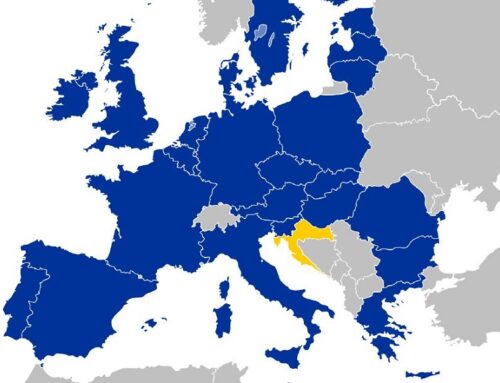Last month, Poland once again rocked the European boat of unity when its Constitutional Tribunal recognized several key articles of one of the EU founding treaties as incompatible with the Polish Constitution (1). The ruling means that Poland no longer respects the primacy of EU law over its legislation in a number of areas. Soon thereafter, the media, academic circles, and politicians of both pro-government and opposition camps began a wide discussion over the possibility of Poland leaving the European bloc by following the footsteps of the UK in a similarly dubbed fashion, which is known as ‘Polexit’. The current article provides a look at the history of the Warsaw vs. Brussels and Luxembourg dispute over judicial matters, analyzes the phenomenon of democratic backsliding in Poland as a root cause of the conflict, and discusses the prospects of ‘Polexit’.
The Key Cases
Poland since its accession to the EU in 2004 used to be the role model of democratization and economic growth — subject of inspiration for other progressive societies (2,3). However, since the Law and Justice party took power in 2015, the trend made a 180-degree turn.
Currently, the country’s relations with the European bloc are going through a rough patch, to put it mildly, in a number of areas, including human rights, freedom of LGBT, and even a costly dispute over a coalmine at the border of the Czech Republic (4). However, the dispute regarding Poland’s judicial system and the primacy of EU law is the only one that costs the country €1 million daily and can potentially lead to the dismantling of the European judicial system (5).
Before analyzing how Poland got to this point and what can follow afterwards, it is necessary to look at recent developments leading to the escalation of the Warsaw-Brussels conflict. Earlier, the European Court of Justice (ECJ) penalized Poland with the highest daily fine it ever imposed on an EU-member state for not complying with its order to suspend a controversial organ — the Judicial Disciplinary Chamber of the Supreme Court, which has the authority to sanction judges over the content of their verdicts (6). The chamber was created in 2019 as part of judicial reforms spearheaded by the ruling in Poland Law and Justice party and is said to be used to punish judges who question or object to political decisions, especially regarding the changes in judiciary, made by the PiS government (7,8). Despite giving in to the mounting pressure from the EU and promises by the Polish politicians, including the main PiS ideologue Kaczynski (9), to shut down the chamber, it continues functioning (10). Prior to that, another body, the National Council of the Judiciary (KRS), which is in charge of nominating judges, also happened to be under scrutiny by the ECJ. In 2017, due to amendments concerning the law on the KRS, the lower chamber of the Polish parliament (Sejm) was granted the right to select members of the KRS from a limited pool of candidates supported by the public and judges (11).
In mid-2018, during the process of nomination and appointment of judges mainly to two chambers of the Supreme Court six unsuccessful candidates lodged a complaint regarding the legality of the selection procedure, which was carried out in a rushed and unfair manner with disregard to formalities. Normally, the appointments of the ‘successful’ candidates should have been suspended until the proper inquiries were made (12). However, the President of Poland who seals the appointments declined to do so, and eventually it led to a lawsuit at the ECJ. It announced its ruling in March 2021, stating that the previous amendments to the law of the KRS, which brought about the absence of effective judicial review of the appointments, were liable to infringe EU law (13). In an anticipated manner, one of key representatives of the Polish judiciary stated that the verdict interfered in the justice system of Poland and thus violated EU law itself (14). Due to the apparent lack of its independence from the legislative branch, the KRS was suspended from the European Network of the Councils for the Judiciary in 2018 (15).
Among myriads of judicial squabbles between the EU and Poland, one of the latest ones also deserves attention, as it might have been the last drop in a long lasting battle. In October, while the Polish Constitutional Tribunal was still hearing the notorious ruling endangering the whole European architecture, the ECJ sided with a local Polish judge who without his consent was transferred from one department of his court to another. Such practices, the ECJ concluded, are ‘potentially capable of undermining the principles of the irremovability of judges and judicial independence’ (16). The reaction of Polish authorities can be represented by its Prime Minister Mateusz Morawecki, who stated that such a verdict meant to destabilize the system and potentially lead to chaos (17). Moreover, he added that such ECJ rulings are only subject to final assessments by Polish courts.
Democratic Backsliding and the Overhaul of Judiciary in Poland
The underlined logic behind the disputes briefly outlined above can be explained through the phenomenon of democratic backsliding. According to Kaufmann and Haggard, this process means ‘the incremental erosion of democratic institutions, rules and norms that results from the actions of duly elected governments, typically driven by an autocratic leader’ (18). In a more narrow sense, it also means undermining one of the key principles of democracy, which is the separation of powers. This is applicable to Poland after the conservative PiS party took power in 2015 as it under the banner of ‘reforms’ aiming at modernizing the judicial system of the Soviet-era legacies launched a gradual attack on the country’s judiciary, which eventually became subjected to the nationalist government.
This process involved the political capture (or court-packing) of the Constitutional Tribunal though appointing a loyal to PiS president of the court and stuffing it with pro-government judges (19). The second step aimed at incapacitating the national Supreme Court by lowering the retirement age of incumbent judges and transferring the power of prolonging the judges’ tenure to the President of Poland (20). Both accounts were criticized by the European Commission and the ECJ on the grounds of incompatibility with the principle of judicial independence (21). As was mentioned earlier, the National Council of the Judiciary with its skewed appointment procedures and the Disciplinary Chamber with its punitive power only contributed to the further worsening situation within the national judicial system.
The result of these ‘reforms’ was summarized in the 2020 annual Rule of Law Report by the European Commission, which stated that such proceedings have increased the influence of the executive and legislative powers over the justice system, and therefore weakened judicial independence’ (22).
What does the verdict of the Constitutional Tribunal mean?
Apparently, the stockpiling verdicts against the Polish state began getting on the nerves of the PiS-led government and its Prime Minister, who earlier requesed the Constitutional Tribunal to review whether the provisions of the key EU treaty were compatible with the Polish Constitution (23). The court, which is controlled by judges closely affiliated with PiS, unsurprisingly announced the verdict that the government was counting on — in favor of judicial independence from the bloc. By stating that the Polish Constitution is of higher authority than EU law, the PiS government shook off the responsibility to implement the rulings by the Luxembourg-based court acting on behalf of the European Commission. From now on, there is no use of appealing to the ECJ in controversial issues as it no longer represents the highest mechanism of justice, at least not in the eyes of Polish authorities. Furthermore, the Constitutional Tribunal stated that the European Union authorities were exceeding their mandate and competencies transferred to them by the Republic of Poland. Finally, the verdict barred lower level courts from reviewing the legality of procedures for appointing judges (24).
Moreover, the country’s government referred to similar moves by other European states, specifically Germany, which did place the rule of national law above that of the bloc’s. However, as always, the devil is in the details, and they are more complex than the Polish government would disclose in its official statements. For instance, Polish authorities in their defense brought up the case when the German Constitutional Court in Karlsruhe challenged the authority of the European Central Bank, which approved bond-buying programs, and the European Court of Justice that gave the green light to the process (25). However, this case does not stand against further scrutiny. First, this particular situation concerned the authority of the mentioned European institutions only regarding specific financial procedures and in fact did not threaten the whole European judicial system (26). In addition, the verdict was put forward by the judges and was not dictated by any central government or any higher authority (27). This aspect is especially relevant, as the German judicial system generally upholds a reputation of being independent and transparent, whereas the judiciary in Poland, as it was shown above, is heavily influenced by the PiS-dominated government. What is more, the Polish Constitutional Court’s verdict drove a wedge between Poland’s EU membership with its benefits and its legal obligations, which can have long-reaching consequences.
Among such consequences of said verdict is the possibility of placing the unity of EU’s legal system to a test. Specifically, any issue requiring judicial review — from divorces to international business disputes — can have adverse effects on the proceedings and complicate the lives of regular EU citizens, as well as cause confusion for transnational enterprises no longer able to count on the protection by common European law in Poland (28). The already existing mistrust towards the Polish judiciary can spread even further, as it was evident in the case of an Amsterdam court rejecting the extradition of a Polish national suspected in drug trafficking due to concerns over the fairness of a trial the defendant would get in Poland (29). Another danger of such developments is that it might set a precedent and other EU members would follow Poland’s suit by declaring the primacy of their domestic laws, as then the ‘blanket’ of the European judicial system will eventually be torn apart. The only way the European standards of judicial practices can be applied across the EU equally is to ensure the primacy of the bloc’s laws over national legislation of member states, which is what the European Commission is trying to defend.
Brussels Reaction and Sanctions
Brussels operates on the assumption that within the bloc, there is absolute primacy of EU law over national law (30). Since this premise has been challenged, the European Commission began looking for ways, apart from financially penalizing the enfant terrible of Europe, to make Poland abide by EU law. Lacking supranational law enforcement authorities within the EU and any mechanism of expelling a member state from the bloc, the most effective tool remaining in the hands of the Commission is the conditionality principle allowing to withhold funds from the EU Recovery and Resilience Facility. Currently, Warsaw is expecting from the EU around €36 billion in grants and cheap loans needed for recovery from COVID-19 (31). Suspending such inflows of money that the PiS is counting on for carrying out socially oriented projects before the upcoming parliamentary elections in 2023 can present a serious stimulus for Warsaw to reconsider its disintegrative policies. In its turn, Poland, while blaming Russia for hiking gas prices, has threatened to sabotage the European green initiative called Fit for 55, which aims at cutting down the bloc’s pollution levels by half (32,33).
Another way to put financial pressure on Poland comes from the so-called rule-of-law mechanism that allows suspending certain rights or funding entitlements of a member state when breaches of law endanger EU’s financial interests (34). In particular, this could be applied to further economic assistance for Poland that amounts to almost €70 billion for the next six years (35). This mechanism was already triggered by the Commission in December, however Poland along with its old ally Hungary challenged its legality and currently the process is on hold due to an ongoing review by the ECJ (36,37). Nevertheless, recently, the Commission has sent clear signals that it can resort to this mechanism once again, when it forwarded to Poland and Hungary letters inquiring about the state of rule of law in these respective countries (38). However, it remains to be seen whether the mechanism will actually work.
So, Polexit? Not really. Following the October verdict of the Polish Constitutional Tribunal, up to 100,000 Polish citizens in Warsaw staged a pro-EU protest inspired by leader of the opposition Civic Platform party Donald Tusk (39,40). The number of people who turned up to the rallies all around Poland supporting EU membership clearly signals that Polish society is not willing to part ways with Europe. Moreover, this is corroborated even by the statistical data, according to which at least 8 out of 10 Poles want their country to stay part of the EU (41). In addition, Poland’s EU membership with its access to funds, common European markets, open borders, and infrastructure directly contributed to the country’s economic growth for the period of almost two decades (42).
What is more, the Polish PiS-run government with its rhetoric stating that the fears of Poland leaving the bloc are exaggerated also keeps pledging allegiance to the EU (43). The ruling camp even accused the opposition of spreading ‘fake news’ about the possibility of ‘Polexit’ (44). However, in this case, after practically cutting the Polish judicial system off the common European legal network, the Polish government sends mixed signals, leaving room for subsequent analysis of its motives.
First, the Polish authorities cannot afford publicly admitting its plans to leave the bloc, as with the current pro-EU public sentiments it can cause a change of government. Moreover, judging by the process of consolidating its power over the judicial system, being kicked out of office is not in the plans of PiS. Second, Poland is set to have parliamentary elections in 2023, before which the ruling party needs to fulfil its promises for the public that require substantial funding. In this situation, the whole judicial rift with the EU can be an attempt to put pressure on Brussels so it would hurry with allocating the money — so far, this approach, however, did not prove to be successful. Third, earlier a PiS MP Janusz Kowalski, representing eurosceptics, commented on Poland’s prospects in the EU and singled out 2027, when the bloc will be deciding on the new budget, as a potential benchmark when the country needs to be ready to hold a referendum on the exit from the EU (45). He motivated such a projection by the possible increase in costs associated with Poland’s membership in the bloc. Deputy Marshal of the Sejm Ryszard Terlecki was even more categorical, when he dubbed the EU ‘dictatorship of Brussels bureaucracy’ and called for ‘drastic solutions’ (46). Such claims appear to be made to probe current society’s attitudes, which by 2023 or 2027 can be skewed in favor of even a further disintegration of Poland and the EU. Meanwhile, it provides an opportunity for the incumbent government to rally around nationalism and put pressure on Brussels expecting certain concessions.
However, considering the economic gains accruing to Poland from its EU membership, such high public support for the Union, and the rhetoric of the mainstream politicians denying any intention to leave the bloc, the full-out Polexit is still unlikely to happen — it is not in the interest of neither the government nor the citizens. Since no EU member state can be expelled from the bloc, the Union will be forced to use its whole arsenal of financial measures to influence Poland. Subsequently, as the Polish government is neither willing to roll back its controversial reforms nor planning to amend the constitution, the Warsaw-Brussels rift will only intensify. Giving in to the behavior of the current Polish government is not an option for the EU leadership either, as it would jeopardize the decades-long European project. Thus, the ball will always be in Poland’s court, and it will have to decide what is more important: the prosperity of the entire nation associated with EU membership or authoritarian ambitions of the ruling power responsible for being on the verge of losing everything the country fought for since 1989. Hopefully, the Polish public will maintain its stance despite any provocations or propaganda campaigns and will prevent the country from descending into outright nationalism and authoritarianism. Otherwise, toying with disintegration and Polexit might pass the point of no return and Poland would indeed repeat the fate of the UK, though with more dire consequences.
Sources:
1 trybunal.gov.pl/en/hearings/judgments/art/11662-ocena-zgodnosci-z-konstytucja-rp-wybranych-przepisow-traktatu-o-unii-europejskiej
2 Everett, Judas. “Poland and Hungary: Democratic Backsliding and the Shifting European Political Landscape.” RUDN Journal of Political Science 23, no. 3 (2021): 394-406.
3 Piatkowski, Marcin. The Warsaw Consensus: The New European Growth Model. No. 131. TIGER Working Paper Series, 2014.
4 www.dw.com/en/fear-and-loathing-at-polands-turow-coal-mine/a-59324808
5 curia.europa.eu/jcms/upload/docs/application/pdf/2021-10/cp210192en.pdf
6 www.euronews.com/2021/10/27/poland-must-pay-daily-fines-of-1-million-over-its-controversial-judiciary-reforms-ecj-rule
7 strasbourgobservers.com/2021/10/26/when-is-a-tribunal-not-a-tribunal-poland-loses-again-as-the-european-court-of-human-rights-declares-the-disciplinary-chamber-not-to-be-a-tribunal-established-by-law-in-reczkowicz-v-poland/
8 Sadurski, Wojciech. Poland’s constitutional breakdown. Oxford University Press, 2019.
9 www.pap.pl/aktualnosci/news%2C925132%2Cprezes-pis-wszystkie-partie-powinny-podpisac-wspolne-porozumienie-w-sprawie
10 ec.europa.eu/commission/presscorner/detail/en/IP_21_4587
11 Grabowska-Moroz, Barbara, and Olga Śniadach. “The Role of Civil Society in Protecting Judicial Independence in Times of Rule of Law Backsliding in Poland.” Utrecht Law Review 17, no. 2 (2021).
12 Sadurski, Wojciech. Poland’s constitutional breakdown. Oxford University Press, 2019.
13curia.europa.eu/juris/document/document_print.jsf?docid=238382&text=&dir=&doclang=EN&part=1&occ=first&mode=req&pageIndex=0&cid=7000418
14 twitter.com/KrystPawlowicz/status/1366680604717289476
15 pgwrk-websitemedia.s3.eu-west-1.amazonaws.com/production/pwk-web-encj2017-p/EGA%20Vilnius%202021/ENCJ%20EB%20propsal%20to%20expel%20KRS%20.pdf
16 curia.europa.eu/jcms/upload/docs/application/pdf/2021-10/cp210173en.pdf
17 tvn24.pl/tvn24-news-in-english/top-eu-court-rules-poland-wrongly-transferred-critical-judge-5441420
18 Haggard, Stephan, and Robert Kaufman. “Backsliding: Democratic Regress in the Contemporary World.” Elements in Political Economy (2021).
19 Pech, Laurent, Patryk Wachowiec, and Dariusz Mazur. “Poland’s rule of law breakdown: a five-year assessment of EU’s (in) action.” Hague Journal on the Rule of Law 13, no. 1 (2021): 1-43.
20 Grabowska-Moroz, Barbara, and Olga Śniadach. “The Role of Civil Society in Protecting Judicial Independence in Times of Rule of Law Backsliding in Poland.” Utrecht Law Review 17, no. 2 (2021).
21 ec.europa.eu/commission/presscorner/detail/en/STATEMENT_19_6225
22 eur-lex.europa.eu/legal-content/EN/TXT/?qid=1602579986149&uri=CELEX%3A52020SC0320
23 www.theguardian.com/world/2021/oct/07/polish-court-rules-that-eu-laws-incompatible-with-its-constitution
24 trybunal.gov.pl/en/hearings/judgments/art/11662-ocena-zgodnosci-z-konstytucja-rp-wybranych-przepisow-traktatu-o-unii-europejskiej
25 www.dw.com/en/top-german-court-rejects-challenge-to-ecb-bond-buying-scheme/a-57566117
26 www.economist.com/europe/2021/10/14/poland-is-a-problem-for-the-eu-precisely-because-it-will-not-leave
27 www.ceps.eu/knocking-on-polexits-door/
28 www.politico.eu/article/polish-legal-woes/
29 www.fairtrials.org/news/amsterdam-court-rejects-polish-european-arrest-warrant-request-over-rule-law-concerns
30 ec.europa.eu/commission/presscorner/detail/en/statement_21_5142
31 balkaninsight.com/2021/10/18/birn-fact-check-what-the-polish-constitutional-tribunal-ruling-means-in-practice/
32 www.politico.eu/article/poland-assertive-action-eu-recovery-cash/
33 www.spglobal.com/platts/en/market-insights/latest-news/energy-transition/102021-poland-calls-for-eus-fit-for-55-climate-legislation-to-be-revised-or-postponed
34 balkaninsight.com/2021/10/18/birn-fact-check-what-the-polish-constitutional-tribunal-ruling-means-in-practice/
35 www.thefirstnews.com/article/poland-biggest-beneficiary-of-eus-cohesion-fund—pm-14322
36 eur-lex.europa.eu/legal-content/EN/TXT/HTML/?uri=CELEX:32020R2092&from=EN
37 www.euronews.com/2021/10/11/eu-s-top-court-begins-looking-at-hungary-and-poland-dispute-over-rule-of-law-mechanism
38 www.politico.eu/article/eu-rule-of-law-penalty-process-poland-hungary/
39 www.bbc.com/news/world-europe-58863680
40 mobile.twitter.com/donaldtusk?lang=en
41 www.bankier.pl/wiadomosc/Ponad-80-proc-Polakow-za-pozostaniem-w-Unii-Sondaz-Kantar-8186349.html
42 www.money.pl/fundusze/fundusze-i-otwarte-granice-to-nie-wszystko-oto-prawdziwe-unijne-konfitury-tylko-u-nas-6702670728457056a.html
43 www.gov.pl/web/eu/statement-by-prime-minister-mateusz-morawiecki-in-the-european-parliament
44 https://www.gazetaprawna.pl/wiadomosci/kraj/artykuly/8271802,morawiecki-polexit-fake-news-klamstwa-tuska.html
45 www.money.pl/fundusze/jest-cos-gorszego-niz-polexit-moze-pojawic-sie-efekt-domina-6703978929073024a.html
46 notesfrompoland.com/2021/09/09/drastic-solutions-needed-in-dispute-with-brussels-dictatorship-says-senior-polish-official/




